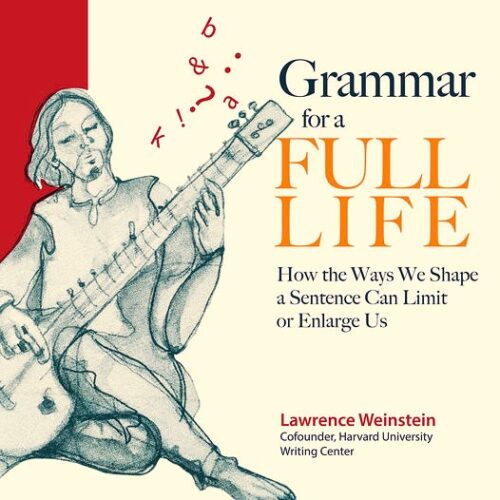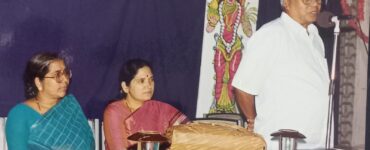Grammar for a Full Life, by Lawrence Weinstein,
Lexigraphic Publishing, Cambridge, Massachusetts, 2020
I don’t remember exactly when I cried last time with tears of joy while going through a book, that too, a grammar book. If grammar turns out to be a nemesis even for native speakers, it is no wonder when others cry off saying: ‘Grammar! What Big Teeth You Have!’ The basic function of grammar, in any language, is to make communication between communities flow easy, clear, and consistent. ‘e. e. cummings jocularly, but succinctly, describes the dilemma between restraint and passion:
[The person] who pays any attention.
To the syntax of things
Will never wholly kiss you.’
Grammar, like language, is truly democratic; its rules are conditioned by usage; they are but reports of ‘verbal usage out on the street these days’ and are not inventions of scholars; ‘Only the myopic scholarship could pigeonhole grammar separating it from real life.’ Grammar infuses its adherent with an inner well of confidence needed to get on better in this world. Prof. Lawrence Weinstein attests to conscious recording of the effects of his grammatical choices on the quality of his life: how his vital signs like respiratory rate, energy levels, and temperature varied; how he could not breathe easy every time he avoided the first-person pronoun; how he maximized his energy with a fusion of active and passive voices; and how he felt warmer by ellipsis, a deliberate omission of information known to him and his reader.
“Grammar for a Full Life,” presents the importance, and the limitations, of grammar in written communication; but it doesn’t stop at that. Weaving a compelling narrative, rich in anecdotes and quotations from great minds from the past, Prof. Weinstein convinces the reader to recognize that ‘each of us, despite speaking the same language, has a unique grammatical profile and a dialect of our own.’ The most interesting part of the narrative, which he handles with consummate ease, is how he looks at the grammar, syntax, and punctuation as instruments- and not hurdles- which help refining our ideas and honing our expression; and how they bring clarity to our communication, adding value to our interactions with our family, friends, and the society at large. He underscores how laxity in observance of grammar rules leads to picayune mistakes in writing, spoiling the credibility of an otherwise impeccable draft and the person. He points out, in a humorous vein, how omission of punctuation marks at important places could lead a plain text to multiple interpretations and avoidable confusion.
He also warns us of its flipside that ‘every person who mastered some few dozen rules of grammar stands in constant danger of becoming a negative force in the life of uninitiated.’ He also reminds us how, as community dwellers, we have been benefited, and continue to benefit, from ‘others’ correction of us to get our bearings and grow into competent adults.’ He emphasizes that ‘correction without empathy would produce more harm than good;’ and, that it would ‘discourage people to give up on pursuits which they could otherwise have excelled in’; and he laments that ‘kinder guidance might have shepherded their careers to fruition.’ Without being a stickler, he prefers adhering to the prevailing grammatical conventions, however inadequate they might be at this moment, to breaking them until a better alternative appears over time.
Gibson said: ‘The trouble with written-word is that it comes without kinesics – no voice box, no eyebrows.’ As such, the text that supplements the speech of the author in his absence lacks the pauses and punches he would have employed to enliven the conversation. Grammar takes up exactly this responsibility to render voice, tone and emotion to the written text forming rules prescribing what to do and what not to. Prof. Weinstein successfully defended this thesis with convincing arguments and presenting a wide array of examples from varied fields of knowledge.
The parting shot, of course, is his finesse in drawing parallels between death and disorderliness in speech and expression. If there is one truth that man could never reconcile to – it is death. Creation of God, ideas of immortality and after-life, and rewards of heaven and punishments of hell are logical extensions of this fear and his urge to beat death. When it knocks at the door, all identities, and distinctions we make with words disappear. Only the order (health) in our body, manifested in grammatically sound words uttered, keep the specter at bay. Thus, works of authors are ‘tangible extensions having a longer shelf-life’ than themselves. At least, ‘they imagine their ‘immortality box’ outlives the engraved end-date on display at the cemetery.’ Or, as Shakespeare confidently declares in his sonnet eighteen, it is their works that confer immortality on ordinary mortals like us.
In a world divided under every conceivable notion, it needs a lot of passion for the language and fellow beings to author a book of this kind. As Gracie Allen mentions in her note for George Burns, her co-host and husband in real life for thirty-eight years, instructing him to find it after her death, we should never “place a period where God has put a comma.”
“Grammar for a Full Life” is a compelling read leading us in that direction.
*









Add comment